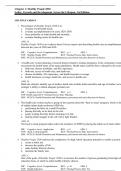Exam (elaborations)
Completed Test Bank For Growth and Development Across the Lifespan 3rd Edition by Leifer! RATED A+
- Course
- Institution
- Book
Test Bank For Growth and Development Across the Lifespan 3rd Edition By Gloria Leifer; Eve Fleck 9405, 5 , 9436, X 1: Healthy People 2030 2: Government Influences on Health Care 3: Cultural Considerations Across the Lifespan and in Health and Illness 4: The Influence of Family on Developing a Lifes...
[Show more]



